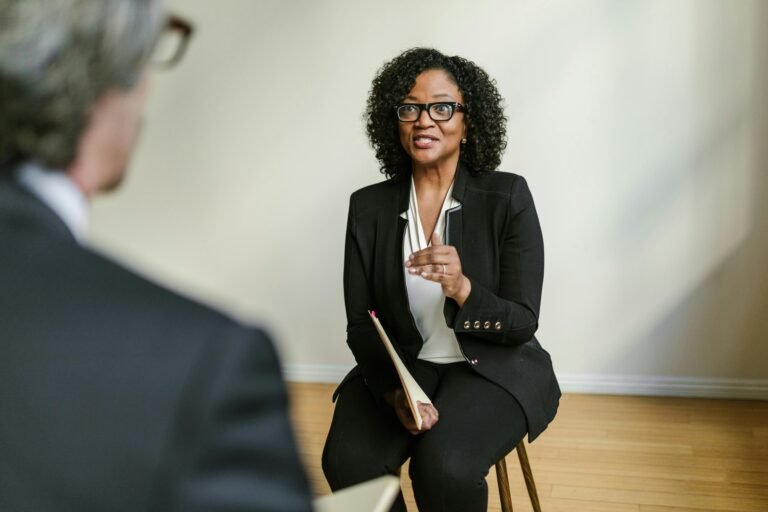One of the more awkward moments in a job interview often comes when you’re asked: “What would you say are your biggest weaknesses?”
It’s a fair question, but let’s be honest, it can feel like a trap. Especially in the field of education and working in schools, where you’re expected to bring passion, skill, and professionalism into every corner of your work, admitting a shortcoming might seem risky.
But the truth is that thoughtful answers to this question can actually help you stand out in a good way.
In this article, we’ll cover:
- Why interviewers ask about weaknesses
- How to respond honestly without undermining yourself
- A strategy to frame your answer as a sign of growth
- 10 expanded examples to help you craft your own
Why Do Interviewers Ask This Question?
Hiring teams aren’t looking for perfect candidates—they’re looking for real people who are open to learning and self-reflection. Especially in schools, where growth mindsets aren’t just for students, being able to talk honestly about areas for development is a strength in itself.
This question gives you a chance to show:
- That you’re aware of your own habits and patterns
- That you take feedback seriously
- That you’re willing to grow professionally
How to Talk About a Weakness (Without Hurting Your Chances)
There’s no “perfect” answer to this question, but there are definitely strategies that help you respond with confidence and honesty.
Be Honest—but Choose Wisely
Pick a real area of growth, but avoid naming something that’s essential to the job. If you’re applying for a role teaching reading, don’t say you struggle with literacy instruction. Instead, choose something more peripheral—like time management or public speaking—and explain how you’re actively working on it.
Skip the Clichés
Avoid generic responses like “I care too much” or “I’m a perfectionist.” Hiring teams have heard those answers too many times, and they often come across as insincere. Instead, offer a personal and specific example that shows you’re self-aware and genuinely working to improve.
Focus on Progress
This is the most important part. You’re not just naming a weakness—you’re showing what you’re doing to address it. That demonstrates initiative, accountability, and a commitment to growth. All qualities schools value highly.
How to Reframe a Weakness as a Strength
Here are a few ways you can reframe your answer to keep it positive and authentic:
1. Find the Upside
Some weaknesses come with silver linings. If you’re naturally introverted, that might make you a great listener who picks up on students’ needs quickly. If you tend to take risks, you might bring creative ideas into your classroom or team meetings.
2. Balance It with a Strength
Maybe you struggle with delegation—but that’s because you care deeply about doing quality work. The key is to show you recognize the limits of that tendency and are working to grow in your ability to collaborate and trust your team.
3. Show What You’ve Learned
Talk about what you’ve done to improve and what the results have been. If public speaking made you nervous, maybe you’ve signed up for professional development workshops or practiced leading small group meetings. These real-life actions show dedication.
10 Strong Examples of How to Talk About a Weakness in Education Interviews
Use these expanded examples as inspiration. Each one shows vulnerability, self-awareness, and—most importantly—action.
1. Procrastination on Repetitive Tasks
“One area I’ve been working on is procrastination, especially when it comes to tasks that feel repetitive or low-priority, like entering data or organizing materials. Early in my career, I’d put these off until the last minute, which added stress and sometimes created small delays. I’ve learned that breaking these tasks into smaller chunks and scheduling time for them throughout the week keeps me on track. I also use tools like digital checklists and reminders to stay focused. This shift has helped me build more consistency in how I manage my responsibilities.”
2. Nervousness with Public Speaking
“I’ve always felt a bit nervous when speaking in front of large groups, particularly in formal settings like staff meetings or parent presentations. While I’m completely comfortable in the classroom, that shift in audience used to trigger self-doubt. To grow in this area, I’ve taken the lead on team updates during faculty meetings and sought feedback from colleagues I trust. I also rehearse in front of small groups to build confidence. I’m proud of the progress I’ve made and now see public speaking as a skill I’m continuing to develop, rather than something to fear.”
3. Difficulty Saying No
“I’ve struggled with saying no in the past, especially when asked to take on additional projects or support roles. I care deeply about being helpful and reliable, but overcommitting has led to burnout and, at times, stretched my capacity too thin. I’ve been learning to pause before automatically agreeing to new responsibilities, to assess my workload and determine whether I can genuinely do it well. This has helped me create healthier boundaries and made my contributions more focused and effective.”
4. Emotional Investment in Student Success
“I tend to become very emotionally invested in my students’ growth, which is both a strength and a challenge. I care deeply about helping every student succeed, but I’ve learned that I need to be mindful of not carrying that responsibility home with me. Over the past few years, I’ve developed strategies for maintaining perspective—such as leaning on my team, debriefing with colleagues, and reminding myself that progress takes time. It’s allowed me to stay supportive while also protecting my emotional well-being.”
5. Impatience with Slow Decision-Making
“I like to keep things moving and sometimes find myself frustrated when decisions or processes feel drawn out, especially in committee settings. Early on, I had trouble understanding why others needed more time to process or reflect. I’ve worked on becoming a better listener and learning to value the diverse thinking styles within a team. I now see that what feels like slow decision-making can often lead to stronger outcomes. This shift has made me a more collaborative and empathetic colleague.”
6. Trouble Delegating Tasks
“As someone who takes pride in high-quality work, I used to have trouble delegating. I felt that if I wanted something done right, I should just do it myself. But in a school setting, that mindset isn’t sustainable—or fair to teammates who also want to contribute. I’ve learned to let go of some control, trust in my colleagues’ abilities, and share tasks based on people’s strengths. The result has been a stronger sense of team cohesion and better outcomes for our students.”
7. Losing Focus During Routine Tasks
“I do best when I’m engaged in dynamic, people-centered work like teaching or collaborating with colleagues. I’ve noticed that routine administrative tasks—like tracking attendance or filling out forms—can lead me to lose focus or rush through them. To address this, I’ve started treating those tasks as non-negotiables by scheduling them at times when my energy is naturally lower. This has helped me complete them more thoroughly and avoid errors. It’s also taught me to respect the role these ‘small’ tasks play in the bigger picture.”
8. Jumping to Conclusions
“I used to form opinions quickly based on first impressions, which occasionally led me to misunderstand situations or make decisions without all the facts. I’ve worked hard to slow down and seek multiple perspectives before jumping to conclusions. Now, I make it a point to ask clarifying questions and take a moment to reflect before responding. This has made me more thoughtful in both my decision-making and my relationships with colleagues and families.”
9. Struggling with Self-Doubt
“Even with years of experience, I’ve sometimes struggled with self-doubt—particularly when stepping into new roles or trying new instructional strategies. I used to second-guess myself or worry that I wasn’t measuring up. I’ve been intentionally working on this by keeping a journal of successes, setting realistic goals, and actively seeking out feedback. This has helped me build confidence and take healthy risks, which I now see as essential to professional growth.”
10. Resistance to Change in Routines
“I’m a person who thrives on structure and routine, which can make it hard for me to embrace sudden changes in schedule or process. In a school setting, flexibility is essential, so I’ve been working on shifting my mindset. I’ve started viewing change not as disruption, but as an opportunity to learn something new. By practicing flexibility and staying open to new ideas, I’ve become more adaptable—and that’s had a positive impact on how I support students and collaborate with my team.”
In Closing: Focus on Growth Over Perfection
When interviewers ask about your weaknesses, they’re really asking trying to understand if you are reflective, coachable, and committed to growth.
As someone working in or aspiring to join a school community, your willingness to grow is one of your greatest assets. You don’t need to be flawless—you just need to be honest, intentional, and always learning.
So next time this question comes up, take it as your moment to show who you are—not just as a professional, but as a person.
Related Posts
How to Use the STAR Method to Answer Interview Questions
How to Conduct a Self-Assessment to Identify Your Strengths and Weaknesses









